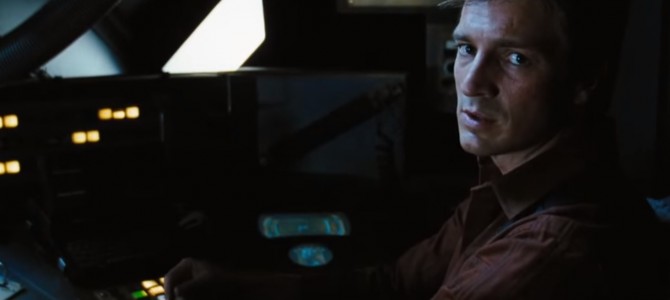
As readers of The Federalist are no doubt aware, very few recognized movies in recent decades exhibit non-leftist themes, whether on free-market economics, moral imperatives, national security, or the evils of micromanaging authority.
“Ghostbusters” comes to mind on economics. “Chariots of Fire” extols faith without cloying sentimentality. “Red Dawn” (the 1984 one, not that absurd remake) epitomizes our lives under Soviet occupation, and “Hanoi Hilton” provides a glimpse of the inhumane treatment a communist society metes out towards prisoners. “Braveheart” exemplifies Scottish struggle against thirteenth-century England’s tyranny.
However, science fiction, the purveyor of future dreams, is largely a wasteland, with execrable fare such as “Avatar” and “Elysium.” No, “Apollo 13” doesn’t count.
The dystopian Hunger Games series represents something of an exception, in that although critical theory socialists admire its portrayal of class divisions, non-leftists appreciate its acknowledgement that government enforces the misery of ordinary people, not the market, which in fact supplied the token “Mockingjay” pin Katniss Everdeen wears.
Despite fans’ fondness for bold adventure in the original Star Trek television series, the movies lack much galvanizing purpose, as explained at length by Timothy Sandefur in The Federalist and Claremont Review, with the singular exception of “First Contact.”
Hiding on the Edge of Civilization
Nonetheless, sci-fi lacks a “leave me alone” epic tale, except for “Serenity,” a 2005 space western written and directed by Joss Whedon that continued from the short-lived “Firefly” television series in 2002 and featured the same cast. Set in the twenty-sixth century, Malcolm Reynolds (Nathan Fillion, currently the main character in the television series “Castle”) retired from the battlefield after having fought with the disbanded “browncoats” Independent side that lost against the Alliance. The Alliance is a domineering and paranoid hyperactive polity run by a central authority called Parliament that suffocates all in its embrace.
In the “Firefly” series, Mal tries to avoid the Alliance, and to that end purchased a Firefly-class cargo spaceship with which to earn his keep by freight transport, as well as scavenging and smuggling. He names his ship “Serenity,” after the valley of the browncoats’ surrender. Fugitive passengers and a fractious crew join his struggles, while sharing neither his aspirations nor his decisions.
The movie continues in this vein with a twist. The Alliance sets its sights on eliminating passenger River Tam (Summer Glau) as a security threat for her supposed clandestine knowledge. The Alliance assigns an assassin (Chiwetal Ejifor, best known for his starring role as Solomon Northup in “12 Years a Slave”) to search for her. The Operative, as he is known, eventually triggers River to alert him to her presence, and while tracking her down causes widespread and tragic whack-a-mole destruction.
At last, Mal seeks refuge by retreating to a derelict planet called Miranda, but his ship must cross a no-man’s-land of Reavers who infest a region of space noted for mayhem and cannibalism. Once there, the Serenity crew encounters a recording that explains the demise of all the inhabitants: they stopped caring and died until the Reavers butchered the remaining few.
To pacify the population, the residents had been administered G-23 Paxilon Hydrochlorate, an aerosol tranquilizer nicknamed “Pax.” Its effect eliminated motivation from the people on the planet, except for a minor remnant that became hyper-aggressive. These became the Reavers that prowl at the edge of civilization. Parliament had suppressed this information about Miranda’s mass carnage and, realizing River might remember that, also decided to kill her to prevent the public from discovering this secret.
‘I Aim to Misbehave’
At this stage, Mal delivers his “St Crispin’s Day” speech to the crew: “Sure as I know anything, I know this: they will try again. Maybe on another world, maybe on this very ground swept clean. A year from now, ten? They’ll swing back to the belief that they can make people… better. And I do not hold to that. So no more runnin’. I aim to misbehave.”
With that, they re-cross Reaver space and goad the Operative’s fleet to attack Mal’s Firefly, while followed by a hornet’s nest of Reavers. The respective ship formations are cringe-worthy from an orbital mechanics perspective, but ignoring that and other physics deficiencies, the plucky team manages to hold off the Reavers and broadcast the Miranda secret. In an act of mercy or acknowledged futility, the Operative ultimately decides to refurbish the damaged Firefly ship and send the surviving members on their way.
Okay, cute. But, how can “Serenity” spawn libertarian or conservative precepts when the director is a Hollywood liberal and Obama donor? Well, inspiring principles need not originate solely from the righteous. Recall Luke 9:49-50 (and Mark 9:38-39), when the disciples asked Jesus to tattletale on an interloper who was casting out demons. The master chastises them, saying, “Do not stop him, for whoever is not against you is for you.” We take our occasional allies wherever they come.
The Evils of Do-Gooderism
The social impulse to “make people… better” affects do-gooders across the political spectrum, albeit to different degrees and regarding sundry human traits. We are social creatures, and conformity develops cohesiveness, especially in times of adversity. Traditionalists in close-knit cultures enforce moral imperatives through community censure, both to constrain iconoclast expressions and propitiate the accepted deities their society worships.
Social-justice advocates seek an economic order that permits everyone to prosper, but at the expense of the productive members—especially entrepreneurs, who accept a disproportionate level of risk. These “you didn’t build that” redistributors neglect to consider or worse refuse to realize that severing incentives from reward leads ultimately to mass starvation, as eventually one runs out of other people’s money, as a well-known British prime minister observed. The entomologist E. O. Wilson quipped about Marxism, “wonderful theory, wrong species.”
Striking a balance between “live-and-let-live” and enforcing proper behavior continues to be a struggle in the modern age. On the tenth anniversary of its release by Universal in September 2005, “Serenity” reminds us to temper our impulse for enveloping others under suffocating control.
That also goes for the Alliance-mimicking centripetalists, who dominate the media, arts, courts, universities, bureaucracies, and so much in between. They ought to watch that film also. One day, progressives too may find themselves with diminished license for pressuring others about what to do and how to think. Then perhaps they will recall the Roman warning to conquerors parading in a triumph: sic transit gloria mundi, thus worldly glory is fleeting. Even if we have to wait five centuries or so.









